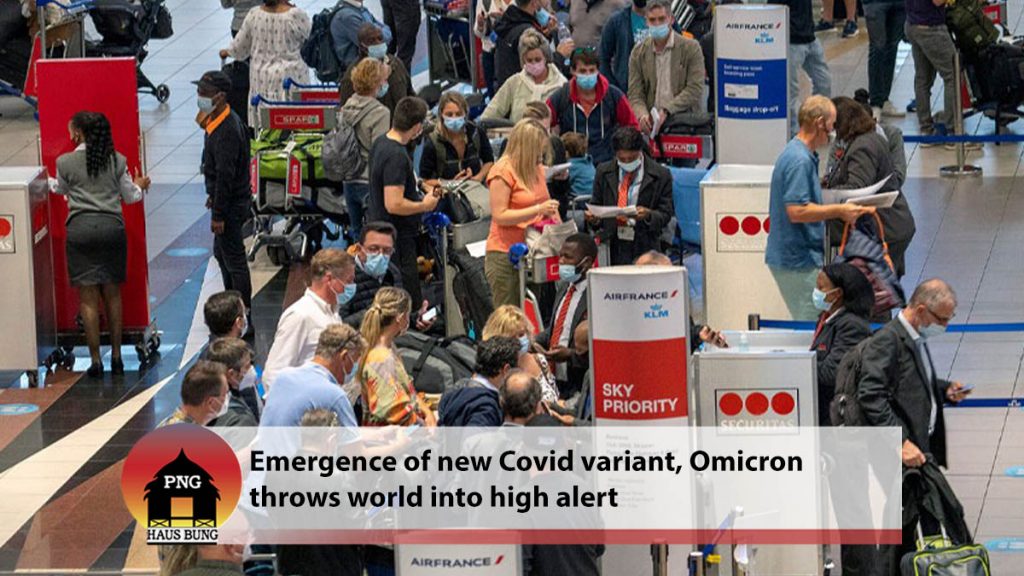Nations in southern Africa protested bitterly today as more of the world’s wealthiest countries cut them off from travel, renewing a debate over border closures from the earliest days of the coronavirus pandemic and compounding the problems facing poorly vaccinated countries.
The New York Times reports a new coronavirus variant called Omicron, first detected in Botswana, put governments on edge after South Africa announced a surge of cases this week, plunging countries into the most uncertain moment of the pandemic since the highly contagious Delta variant took hold this spring.
As in the early days of Delta, political alarm spread quickly across the world, with officials trading blame over how the failures of the global vaccination effort were allowing the virus to mutate, even as researchers warned that the true threat of the new variant was not yet clear.
Bearing a worrying number of mutations that researchers fear could make it spread easily, Omicron was spotted this weekend in patients in Britain, Germany and Italy, leaving in its wake what scientists estimated to be thousands of cases in southern Africa and tens or hundreds more globally.
One nation after another shut its doors to southern Africa even as they spurned public health measures that scientists said were far more urgently needed to take on the new variant.
Australia, Thailand and Sri Lanka are among the latest countries to join the United States, Britain and the European Union in banning travellers from South Africa and nearby countries.
Israel announced the world’s strictest ban to date, sealing its borders to all foreigners for 14 days after one case was confirmed in the country.
Prime Minister Naftali Bennet of Israel says the key here is caution and minimal risks until they know more.
Health officials in the Netherlands announced that 61 passengers on two flights from South Africa had tested positive for the virus, the latest indication of how difficult it might be to stop the variant from crossing borders.
The cascade of travel closures triggered a wave of resentment among Africans who believed that the continent was yet again bearing the brunt of panicked policies from Western countries, which had failed to deliver vaccines and the resources needed to administer them.
Scientists said richer countries, having already hoarded vaccines for much of 2021, were now penalizing parts of the world that they had starved of shots in the first place. Francois Venter, a researcher at University of the Witwatersrand in Johannesburg says told you so, referring to warnings from African researchers that delaying vaccinations there risked the emergence of new variants.
Scientists worried that the restrictions would discourage other nations from reporting variant cases, out of fear of being slapped with travel bans.
Border closures have provoked debate during a succession of public health crises, including the Ebola outbreak in 2014, with global health officials warning that such bans can interrupt the flow of medical supplies and do economic damage that makes countries reluctant to report health threats.
The chaotic introduction of the closures in Amsterdam on Friday left some 600 passengers on two flights from South Africa crammed into planes and then unventilated rooms for about 30 hours.
Those who avoided hotel quarantines by testing negative scattered to other destinations after receiving results around 3am Saturday.
Experts say the border closures would wreak havoc in African countries that were counting on reopening.
In South Africa, December is traditionally the high season for tourism, one of the country’s biggest industries, and operators had been banking on a surge in visitors from Britain, which had removed South Africa from its “red list” only last month.
South Africa’s number of daily infections — 2,828 on Friday — was a small fraction of case counts in countries with similarly sized populations, like Germany and Britain, not to mention the United States.
Just over 10 percent of people in Africa have received one dose of a vaccine, compared with 64 percent in North America and 62 percent in Europe.
For the countries imposing travel bans, scientists said, far more consequential than delaying the arrival of new Omicron cases was the question of what they would do with whatever time they had bought themselves to respond.
SOURCE: FIJIVILLAGE

